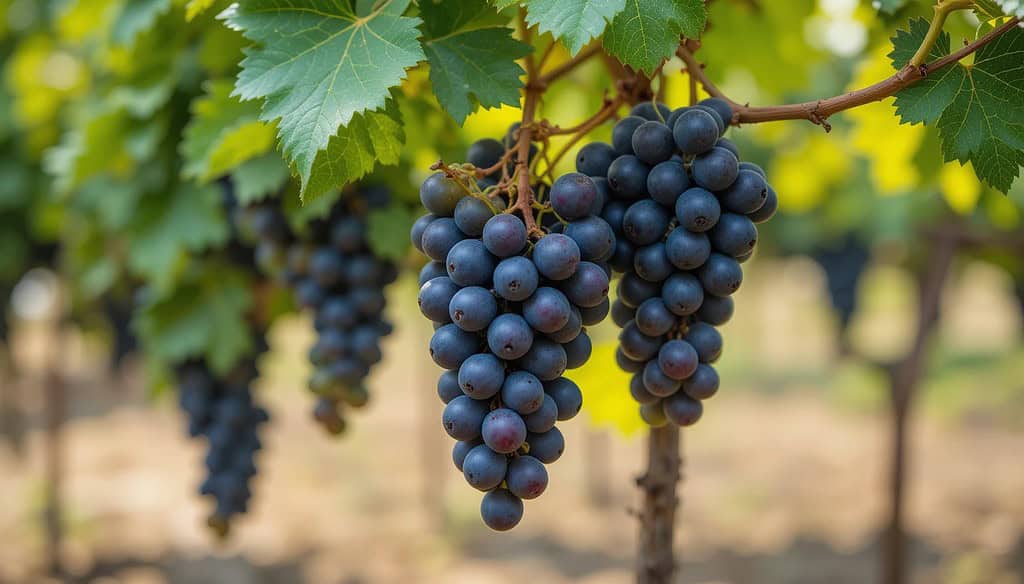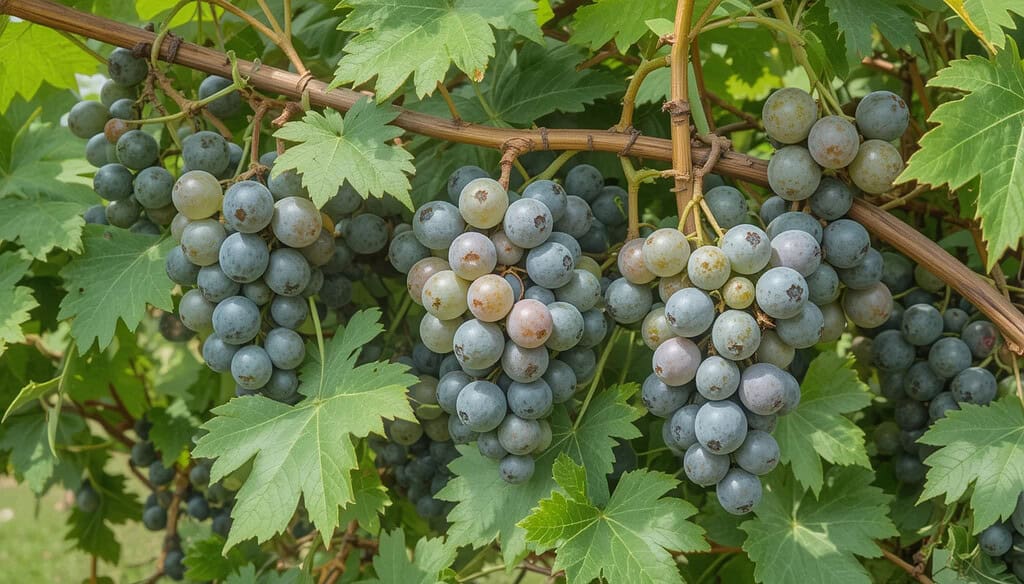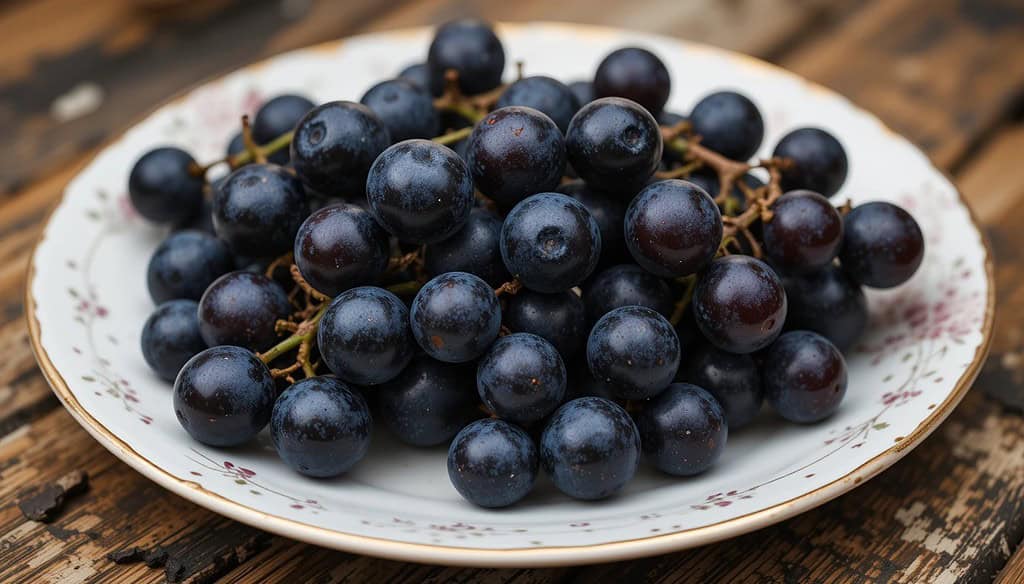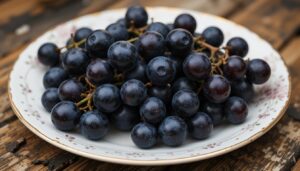Table of Contents
Unyielding Legacy of Muscadine Grapes

Scientifically known as Vitis rotundifolia, Muscadine grapes belong to the Vitaceae family of plants. Muscadine grapes are different than the other varieties of grapes. Muscadines are wild, tough, and resilient. While other grapes face grave threats from various diseases and pests, Muscadines endure. Their thick skins and bold flavors tell the story of a fruit that fights vigorously against nature’s trials. The extreme heat and heavy air of the South and South-Eastern USA have made them tough and hardy.
Long before vineyards lined the hills of Europe, Muscadine grapes grew naturally in forests and swamps. Native tribes knew their worth, using them for food, medicine, and drink. Early settlers found them strange—too thick, too different—but over time, they learned to respect their strength. Unlike the fragile grapes they had known, Muscadines did not need careful tending. They flourished where others failed.
Muscadines are unique in their genetic make-up. They hold extra chromosomes that make them stronger and tougher. They resist the diseases that destroy other grapevines. Various threats – Powdery mildew, black rot, pests—prove less menacing to them. Farmers elsewhere rely on chemicals and pesticides to keep vines alive, but Muscadines can survive without them.
Their story of the Muscadine grapes is one of defiance. They were never bred for perfection. They were never shaped to fit the mold of European wine culture. They remained as they were—bold, stubborn, raw. Today, they are a piece of Southern identity that is woven into family farms, local wines, and old traditions.
Muscadine grapes are more than just fruit. They are survival, history, and nature’s own experiment in strength. They remind us that not all things need refining. Some are meant to be wild, meant to endure, meant to stand apart.
The 8 Genetic Superpowers of Muscadine Grapes
1. Extra Chromosomes for Diversity
In natural selection, some species are given an extra edge. Nature could provide these species with a hidden advantage that is coded deep in their DNA. Muscadine grapes are one of them. While most of the common grapes carry 19 pairs (a total of 38) of chromosomes, Muscadines have 20 (a total of 40). This may seem small, but it changes everything.
The extra chromosomes provide extra flexibility and better protection. Muscadines are more adaptable, resistant, and capable of thriving in harsh environments. Their DNA allows them to develop traits that make them stronger than other common grapes. This is why they resist disease so well. It is why pests struggle to take them down. Their genes hold more options, and more tools for survival.
Other grapes were bred into softness. They were chosen for sweetness, size, and ease of farming. In that process, they may not develop better resistance, toughness, or the ability to fight back. Muscadines never lost these things. They kept their wild strength. The extra chromosome set is proof of that.
This genetic edge also brings diversity. Muscadines come in shades of deep purple and burnished bronze, their flavors shifting from bold tartness to smooth honeyed sweetness. Two different vines may have different traits that set them apart. This diversity makes them less vulnerable to the dangers that plague other vineyards.
In the world of breeding, Muscadines hold promise. Their genes could strengthen weaker grape species. Their resilience can be given to the fragile vines. As climate change and disease threaten global agriculture, the world may look to Muscadines—not just for their fruit, but for their DNA, their hidden strength, and their untapped potential. They are nature’s experiment in survival, a living example of what happens when evolution refuses to play by the rules.
2. Resistant to Common Grape Diseases
Grapevines are often fragile. They fall to diseases like powdery mildew and black rot. These vines often need chemicals to stay alive. But Muscadine grapes are different. They are better protected from these diseases. Their secret lies in their genetics. Their genetics shield them from these diseases without human help. Powdery mildew haunts most grape species, coating leaves and fruit in white, suffocating dust. It spreads fast, thriving in damp air, choking life from the plant. But Muscadines don’t bow to it. Their thick skin, rich in natural compounds, acts as armor. Fungi struggle to take hold. The disease tries, but the grapes refuse to yield.
Black rot is another enemy, one that turns grapes into shriveled ghosts of what they once were. European vines crumble under its attack. Muscadines, though, fight back. Their leaves produce tannins—nature’s own defense—to keep the disease from creeping in. Their genes have seen centuries of battles, and they have learned how to win. Pests, too, think twice before feasting. Insects that plague vineyards find little comfort on Muscadine vines. The grapes carry a natural bitterness that keeps them safe. Farmers elsewhere spray chemicals, but here, nature does the work.
This resilience isn’t luck. It’s evolution. Muscadines grew wild before humans touched them, shaped by hardship, and carved by survival. They didn’t need protection; they became protection. In a world where crops are destroyed due to disease, Muscadines are an exception. They stand firm and defiant against these diseases due to their adaptability and genetics. They are a gentle reminder that sometimes, the strongest things need nothing but themselves.
3. Thicker Skin for Survival
Survival is not about being the sweetest or the prettiest. It is about enduring. Muscadine grapes know this well. Their skin is thick, rough to the touch, almost defiant. While other grapes split under pressure, Muscadines hold firm. This is no accident. It is nature’s way of keeping them alive.
The wild swamps and forests of the American South are no kind of home. Heat, insects, and disease are constant threats. Most grapes would wilt, their thin skins no match for the elements. But Muscadines evolved differently. Their skin acts like a shield. It traps moisture in times of drought and keeps the fruit from drying out. It forms the first line of defense against fungi and stops any disease before it can take hold.
The thicker skin of Muscadines proves effective against pests. The thick skin is not easy to pierce. Due to the tough skin, Insects, bugs, and bacteria may find it difficult to reach the softer flesh of the fruits. This toughness means Muscadines need fewer pesticides and fewer human interventions. They survive on their own, as they always have.
However, the thick skin of the Muscadines does more than protect. It holds power within. The very toughness that keeps threats out also keeps nutrients in. This skin is rich in antioxidants, bursting with compounds that fight aging, disease, and inflammation. What others see as roughness, science sees as strength.
Muscadines do not ask for help. They do not beg for care. They stand on their own, wrapped in a skin built for battle, thriving in a world that would break lesser fruit. In a vineyard of fragile things, they are unshaken.
4. Higher Antioxidant Levels
Some fruits are sweet. Some are juicy. Muscadine grapes are powerful. They carry something deep inside them, something that makes them more than just food. Their skins and seeds are loaded with antioxidants—natural compounds that fight aging, disease, and decay. This is not luck. This is genetics.
Most grapes have polyphenols, but the Muscadine grapes have more. Their genes push them to produce higher levels of resveratrol, flavonoids, and ellagic acid. These are the compounds that protect cells, slow damage, and keep bodies strong. Where European grapes offer a taste of health, Muscadines offer a flood of it.
This richness in antioxidants is not just for humans. It is part of their survival. In the wild, these compounds help the Muscadine grapes to resist bacteria, fungi, and pests. They strengthen cell walls, making the fruit tougher, and harder to break down. What protects them in nature becomes a gift to those who eat them.
Science has noticed. Studies link Muscadine grapes to heart health, reduced inflammation, and even cancer prevention. Their antioxidants fight free radicals, the unstable molecules that cause aging and disease. They are more than just grapes. They are medicine, wrapped in a thick-skinned, wild-grown package.
Muscadines were not bred for health benefits. They did not need human hands to shape them into something useful. They grew as they were, full of strength, full of life. In a world seeking natural solutions, they stand ready. They offer the same power through their fruits and seeds that kept them alive for centuries. Other fruits may be sweeter and softer, but they do not carry the raw, untamed energy of Muscadines.
5. Adaptability to Hot and Humid Climates
Most grapevines struggle in heat. They wither under a blazing sun, their leaves curling, their fruit shrinking. Humidity invites rot, turning clusters into mush before they ever reach harvest. But Muscadine grapes? They don’t just survive in the Southeastern U.S.—they thrive.
These grapes were made for the South. The thick air, the long summers, the relentless sun—these are not threats to them. They are home. Their genetic makeup allows them to endure scorching temperatures that would burn other vines. Their deep root systems pull water from dry soil, keeping them strong even when rain is scarce.
Humidity, too, is no enemy. Fungal diseases spread fast in damp air, attacking weaker vines. But Muscadine grapes are built differently. Their skins are thick, their tannins high, and their defenses strong. The same traits that protect them from pests and disease also shield them from mold and rot.
This adaptability means they require little human help. They do not need constant watering or chemical treatments to survive. They do not demand perfect conditions. They take what the land gives and make the best of it.
For farmers, this adaptability and resilience provide a great opportunity. A fruit that can survive extreme heat and humidity is a rare thing. As climate change shifts weather patterns, Muscadine grapes may become even more valuable. Their adaptability could shape the future of grape growing. They can offer a solution to the farmer to counter an unpredictable climate.
Muscadines are not delicate. They are not fragile. They are built for the hardest conditions, thriving where others fail. They are proof that strength is not about escaping hardship—it is about standing firm in the middle of it.
6. Natural Pest Repellence
Most vineyards are battlefields. Farmers wage war against insects that feast on tender grapes, spraying chemicals to keep their crops alive. But Muscadine grapes? They fight their own battles. They need no shields, no outside help. Their defenses are written in their genes.
Pests know when to move on. Muscadine skins are thick, hard to break through. Their juice holds tannins and polyphenols—bitter, unwelcoming to insects. The leaves themselves contain compounds that deter invaders, sending pests elsewhere in search of easier meals.
This natural resistance is rare. European grapes are vulnerable, unable to protect themselves. Farmers rely on pesticides which may not be a good thing. Pesticides are harmful chemicals that can be dangerous for humans as well. Muscadine grapes, on the other hand, may require no pesticides at all. Muscadine grapes can keep the threats away.
The secret lies in their wild origins. Unlike domesticated grapes, Muscadine grapes originated and thrived in the wild. They grew where they could, fighting off whatever came their way. Over time, these grapes developed their own defenses and passed them down to the next generations. What began as a survival instinct became a permanent trait of their DNA.
This pest resistance is more than just convenient. It is a glimpse into the future. As the world moves away from chemical-heavy farming, crops that defend themselves will become more valuable. Muscadines stand as proof that nature can build strength without human interference.
In a vineyard full of fragile things, Muscadine grapes stand apart. They do not need saving. They do not need protection. They are their own defense, their own fortress, their own survival story.
7. Longer Lifespan on the Vine
Time is an enemy in most vineyards. Grapes ripen, then rot. Farmers rush to harvest before the fruit turns to waste, battling heat, insects, and disease. But Muscadine grapes? They wait. They endure. They stay firm long after others have fallen.
Their thick skin is the first line of defense. Where softer grapes split and leak, Muscadines hold their shape. Moisture stays locked in, keeping them plump and fresh. This toughness allows them to stay on the vine longer without shriveling, without losing their power.
Rot is another enemy they refuse to bow to. In humid climates, decay spreads fast, turning fruit to mush. But Muscadines do not break so easily. Their natural compounds fight off mold, bacteria, and fungi. They keep the Muscadine grapes intact far beyond the usual harvest window.
This extended lifespan means farmers have more control. They do not have to pick their grapes in a panic, racing against time. They can wait, letting the fruit develop richer flavors and deeper complexity. This is a gift in an industry where timing is everything.
Beyond the vine, this durability extends to storage. Muscadine grapes last longer after picking, resisting spoilage. They do not demand immediate consumption. They do not rush to fade.
In a world that wastes too much food, Muscadines offer a different story. They are not fragile. They are not fleeting. They are built to last, holding their strength long after others have given in.
8. Unique Flavor Profiles
Taste a Muscadine grape, and you will know—it is not like any other grape. It is bold, untamed, and unpredictable. A burst of sweetness collides with deep, earthy notes, a wild honeyed richness fading into a tart finish. It is not delicate. It is not subtle. It is alive.
This flavor comes from their genes. Muscadines hold more natural sugars than most grapes, but they also carry tannins, polyphenols, and acids that give them depth. Where European grapes aim for balance, Muscadines embrace contrast. They are both sharp and smooth, both intense and lingering.
Their diversity runs deep. Some of the Muscadine grapes are bronze, while others are dark purple. Some are dripping with floral sweetness while others have skins that are thick with tannins. No two Muscadine grapes are quite the same. Each vine offers its own uniqueness.
The thick skin plays its part, too. As the grape ripens, the skin infuses the juice with bold flavors, adding complexity. The same compounds that protect Muscadines from disease also shape their taste, giving them an edge that softer grapes lack.
For winemakers, this uniqueness is both a challenge and a gift. Muscadine grapes do not fit into traditional molds. Their boldness demands attention, their intensity refusing to be tamed. But in the right hands, they create something unforgettable—wines that are rich, full-bodied, and unmistakably wild.
Muscadines are not trying to be like other grapes. They do not need to. They are their own thing—bold, raw, untamed. A taste of something ancient. A taste of survival. A taste of nature’s defiance.
Muscadine Grapes: A Testament to Evolutionary Ingenuity

Muscadine grapes did not come from careful breeding by humans. Instead, evolution and nature have built them. These grapes faced immense hardship and challenges from nature which in turn made them unique and strong. These challenges and hardships incorporated genetic distinctiveness into the Muscadine grapes.
Most grape species followed a different path. Most of the common grapes were cared for and protected by farmers as the common grapes were bred for sweetness and yield. They grew soft and reliant on human hands to survive. Farmers tried to keep them from disease and pests.
Muscadines had no such luxury. They grew in nature, exposed to the heat and humidity of the American South. Deadly fungi and insects dined on them. Extreme heat, humidity, and dampness made their lives hard. However, these challenges also made their genes unique and tough.
Their thick skins provide them with the necessary toughness. The extra chromosomes gave them an edge and allowed them to adapt to harsh environments. They produced natural compounds such as tannins, resveratrol, etc. These natural compounds act as shields and protect them from various diseases. Where common European grapes needed pesticides, Muscadine grapes could grow without them. Evolution has made Muscadine grapes tougher and more resilient.
Their genetic uniqueness makes them more than just a fruit. They could provide important insight into the future of farming. In modern farming, we are trying to grow fruits and vegetables with fewer chemicals and less water. Muscadines show that nature can build strength without chemicals. Their genetics may even help improve weaker grape species. The genetic uniqueness of Muscadines can help these common grapes to become resistant to diseases and pests without the help of pesticides. Muscadines reminds us that true strength comes from hardship.
Celebrating The Genetic Brilliance of Muscadine Grapes

Muscadine grapes are more than just fruits. They show us that nature can create something that is both beautiful and tough. Their genetic powers are not an aberration of nature. They are the proof of a resilient fruit that is shaped by the challenges of nature.
Where other grapes rely on chemicals, Muscadine grapes can survive on their own. Their evolution is a hard-earned feature that can show us the path to the future. In a time when agriculture faces rising challenges of climate change, environmental damage, and soil depletion, there is a need for fruits and vegetables that have inbuild resistance. Muscadines could offer a solution. They require little care and still can have bountiful produce. It is a rare gift for modern farming which is facing enormous challenges to feed a growing population..
Muscadine grapes also come with numerous health benefits. These unique grapes come with loads of vitamins, antioxidants, and minerals. Various studies have shown their potential in fighting inflammation, improving heart health, and slowing aging. The fact that these grapes are tasty, only adds to their allure.
Muscadines were never meant to be other common grapes. They are meant to be tough and resilient. Muscadines are unwilling to yield to the harsh environment. Muscadines show us the power of nature which can forge an unyielding fruit, equipped with genetic power and uniqueness.
Disclaimers: *This article is only for informational purposes.
**Do not make your important decisions solely based on the information provided in this article. Do your own research.
***Consult a doctor or a medical professional in case of a medical emergency.
****We can’t guarantee that the information in this article is 100% correct.
*****Information in this article may vary or get updated in the future.
Read More Science and Space Articles
- 8 Reasons Why Bergamot is the Super fruit You Need
- Blood Orange Adventures: Around the World in 8 Recipes
- 8 Remarkable Ways Kumquat Shines in Culture and Cuisine
- 8 Amazing Lime Tales: Ancient Groves to Modern Kitchens
- 8 Weird Ways Grapefruit Can Interfere with Medications
- Pomelo in Culture: 8 Heartwarming Ritual Traditions




